Last updated on February 28th, 2024 at 05:58 pm
Learn what to expect with your infant twins 24 months old, including tips, tricks, and advice from real twin parents who have been there.
All content on this website, including medical opinion and any other health-related information, is for informational purposes only and should not be considered to be a specific diagnosis or treatment plan for any individual situation. Use of this site and the information contained herein does not create a doctor-patient relationship. Always seek the direct advice of your own doctor in connection with any questions or issues you may have regarding your own health or the health of others.
Your Twins 24 Months Old
Welcome back returning twin parents! Hello and welcome to the new twin parents who are just finding us today!
You made it through your first 23 months as a twin parent and you’re now heading into your 24th month of twin parenthood. What a huge accomplishment! Little known secret: we knew you could do it!
Now what? Well, this is a good place to start. We have plenty of information and resources to help you navigate twin parenting with your twins 24 months old.
Our twin parenting tips come from our very own experienced twin parents from around the world! These parents have all been there, done that, and are ready to share their tips and tricks with you.
This second year is full of excitement, questions, and even some anxiety. Not to worry, we’ve got your back. We’ve laid out all our best tips, tricks, and advice for twins 24 months old.
Got preemies? Make sure to consider your premature twins’ corrected age when reviewing whether or not they are meeting their milestones at appropriate times. In the vast majority of cases, preemies catch up by school-age and go on to succeed at the same level as their peers. Learn more about preemie developmental milestones here

What to Expect with Twins 24 Months Old
- Your twinnies are 2 years old!!! Time to celebrate!
- At this age, your child understands more than they can say. Continue to engage them, especially by telling them what comes next in the day and warning when an activity is almost over.
- Now is the time to start potty training, or preparing for it anyways!
- Your little ones memory is also much more sophisticated than just a few months ago. They’re beginning to understand abstract concepts such as “now” versus “later” and “more” versus “fewer.”
- Tots this age are known for their big ways of expressing themselves no matter what they’re feeling. Talk about dramatic!
- At this stage, kids think the world is all about them. Concepts like sharing don’t make a lot of sense.
- Your toddlers may show a preference for either their left or right hand at this age. But there’s no need to pressure them to choose one or the other. Some kids develop a preference later on.
- Your little ones can speak and be understood about half the time, and may even be able to carry on a (very) brief conversation.
- By this age, most toddlers can repeat words they overhear in a conversation. Time to watch what you say!
- Lots of children — even those who used to sleep like logs — may start waking in the night, which is not pleasant for anyone involved.
- Don’t be surprised by your little one’s compulsion to ask the question “why?” about a thousand times a day.
- If you haven’t already, look into joining a local moms of multiples club (aka twin club). Read about local twin clubs here or join our Twiniversity monthly twin club on Zoom by signing up for a Twiniversity Membership.

Want to be the first to know about giveaways, deals, and more just for twin parents? Sign up for the Twiniversity email list! Subscribe today to get emails about giveaways, events, weekly article roundups, and more! Pregnant with twins? We’ll be sending you a weekly twin pregnancy email to keep you on track with your pregnancy to-do list! Click here to learn more… and while you’re at it, check out our Complete Baby Safety Course and Twin Parent Memberships.
Common Concerns From the Moms Who Have Been There With Twins 24 Months Old
- When should we switch from cribs to beds?
- Where do I even begin with potty training?
- What can I do to encourage my twins to share?
- How delayed is too delayed when it comes to twins and language?
- How do I deal with double tantrums?
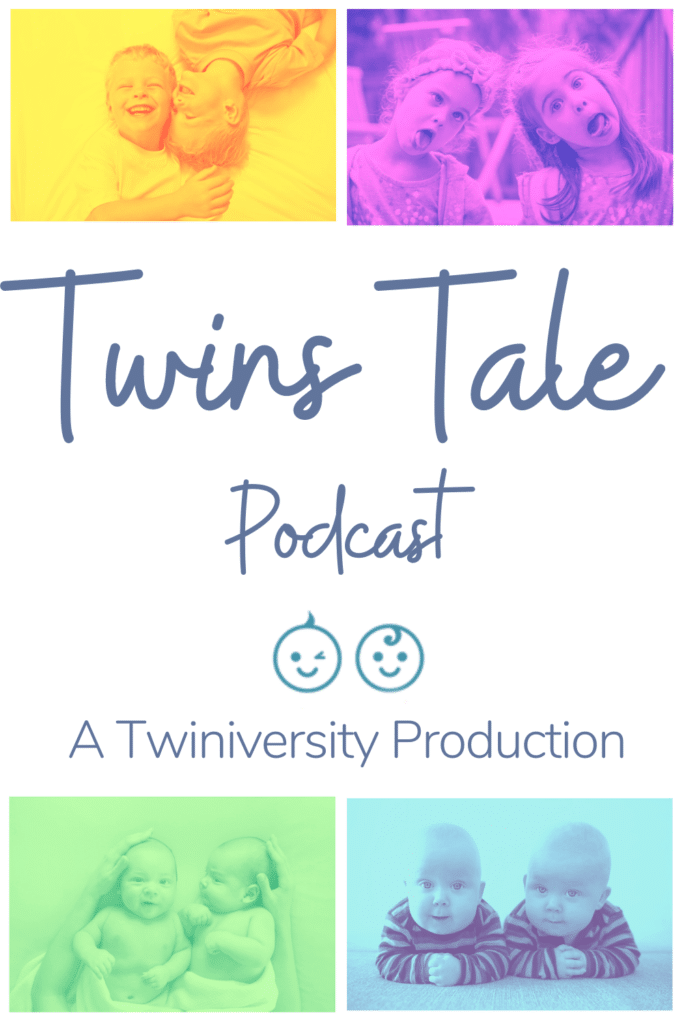
The Twins Tale Podcast by Twiniversity is an intimate look into the lives of twin parents and their twins at all ages and stages, from birth through college. We interview twin parents in the trenches and ask all the burning questions you want to know about raising twins: schedules that work, feeding your twins, getting out of the house, finding sanity, and so much more. Subscribe for FREE today!
Milestones & Developmental Leaps Parents Have Noticed With Twins 24 Months Old
What’s going on with development in twins 24 months old?
- Use simple phrases, such as “more milk.”
- Ask one- to two-word questions, such as “Go bye-bye?”
- Follow simple commands and understand simple questions.
- Speak about 50 or more words.
- Speak well enough so that you or another caregiver can understand at least half the time.
- Scribble at will
- Turn over a container and pour out its contents
- Build a tower of four blocks or more
- Point to things or pictures when they are named
- Know the names of parents, siblings, body parts, and objects
Inform your doctor if your child:
- Walk properly — they should not be walking exclusively on their toes or unsteadily after several months of walking
- Say a two-word sentence
- Imitate actions or words
- Follow simple instructions
- Remember skills they used to have

Challenges You Might Experience With Twins 24 Months Old
There are some challenges to look out for with twins 24 months old
- Are your twins ready for potty training? Learn where to start here.
- It might be time to move to say goodbye to cribs and hello to beds. Read about making the switch.
- Struggling with tantrums? They are no fun! Here’s tips to handle them.
- This is often around the time that your twins may be fighting over toys and even you! Learn how to encourage your twins to sharing here
Tips from Parents of Twins 24 Months Old
Take some tips from experienced twin parents!
- Involve them in setting up their beds, spreading their favorite bed sheet and placing their favorite stuffed toys on it.
- Limit screen time (TV, tablets, phones, etc.) to no more than 1 hour a day of a children’s program with an adult present. Children learn by talking, playing, and interacting with others
- Since they will be going to pre-school sometime soon, introduce them to caregivers, starting with someone in the close family.
- Expect tantrums. They are normal at this age and should become shorter and happen less often as your twins get older.
- Ask your twins to help you open the drawer when you put away clothes or open the door when you go outside.
- Take more pictures than you think you should. They will LOVE to look at them with you soon!
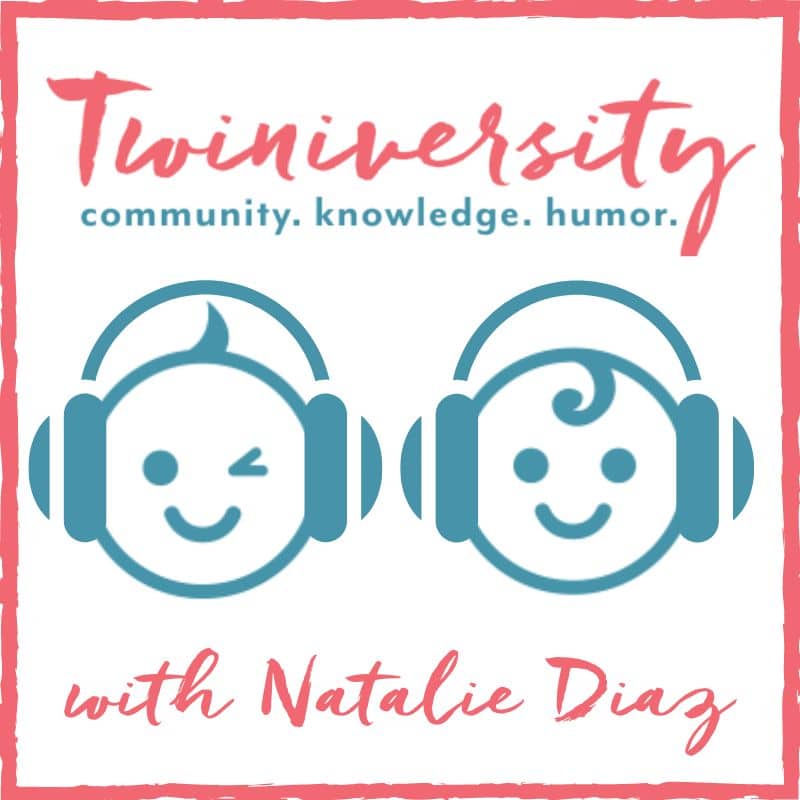
Got twins? Us too! The Twiniversity Podcast with Natalie Diaz was created BY parents of twins FOR parents of twins, from your pregnancy days through your twin’s teenage years, this podcast covers it all. It’s all about parenting twins, offering plenty of strategies for making life better, parenting hacks, and, of course, humor. We are laughing WITH you every step of the way.
Feeding and Nap Schedule for Twins 24 Months Old
You’re really going to want a schedule for your twins! Be adaptable, but try to be as consistent as you can. Here is a suggested feeding and nap schedule for twins 24 months old. You will notice that milk is primarily given in addition to a meal, not used as a meal itself now.
- 6:30/7am – Once they’re awake: change and dress for the day. Give pre-breakfast milk (with vitamins if prescribed) and a snack.
- 8am – Free play time. Give drinks if playing an hour or more ( i.e.: juice mixed with water)
- 8:15 – 9am – Parents (you-time): breakfast, shower, light chores, check e-mails, etc., to be ready to tackle anything that comes along during the day.
- 10am – Breakfast-time with some structured play while toddlers are seated; Sing and act out songs, color, puzzles, etc.
- 10:30 – 11:00am – Free-play in play area/living room
- 11:30am – Clean-up, wash up and nap
- 11:30 – 12pm – Parents: finish clean-up, wash dishes and bottles and have lunch
- 1:00 – 2:00pm – Tots’ awake? It’s lunch time!
- 2:00 – 3:30pm – Free play (in play area/living room) mixed with structured play, i.e.: puzzles, blocks, coloring, etc. Snack time as well.
- 3:30/3:45 – Clean-up, wash-up, brush teeth, story-time and nap (if you children will take a 2nd nap)
- 4pm – 5:45pm – Parent: finish clean-up and rest
- 6pm -Dinner
- 6:30 – 7:30pm – Free play
- 7:30pm – Wind-down, bath time: snack and drink. Let them watch their favorite (15 minute) video
- 8pm – Bedtime: clean up; wash up, brush teeth, story-time, sing a song and lights out!
Do the best you can every day to keep them on the same feeding and sleeping schedule. When you get off track try again for the next feeding or nap.
Do everything in your power to feed your twins together to make sure you get breaks. If they are on opposite feeding schedules, you will never get a break — and you deserve one!
Are You a New Twin Parent?
Check out Natalie Diaz’s book:
“What To Do When You’re Having Two
The Twin Survival Guide From Pregnancy Through the First Year”
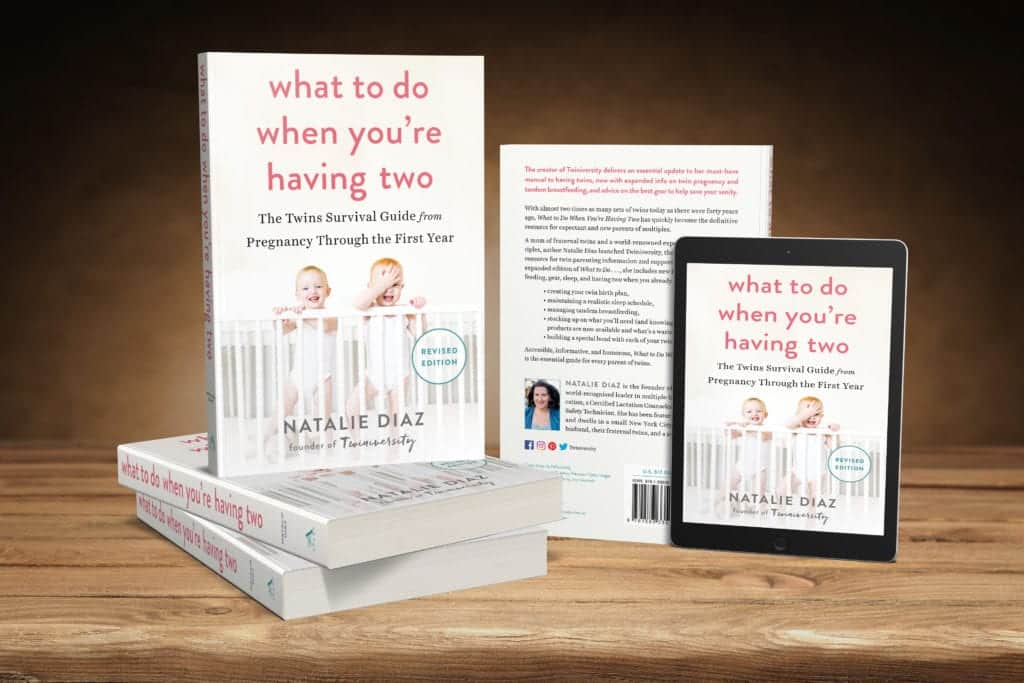
In What to Do When You’re Having Two: The Twins Survival Guide from Pregnancy Through the First Year, national twins guru and founder of Twiniversity (and twin mom herself!) Natalie Diaz provides a no-holds-barred resource about life with twins, from pregnancy and birth all the way through your duo’s first year of life.
Accessible and informative, What to Do When You’re Having Two
is the must-have manual for all parents of twins.
When to Call the Doctor
It’s better to overreact 100% of the time than to underreact once.
Natalie Diaz, Twiniversity Founder and Mom of Twins
All content on this website, including medical opinion and any other health-related information, is for informational purposes only and should not be considered to be a specific diagnosis or treatment plan for any individual situation. Use of this site and the information contained herein does not create a doctor-patient relationship. Always seek the direct advice of your own doctor in connection with any questions or issues you may have regarding your own health or the health of others.
When it comes to calling your doctor or seeking medical advice, you have to learn to trust yourself. If you feel something isn’t right, it probably isn’t when it comes to your twins. When in doubt, call. That’s why the offices have an answering service and staff on call at night or on the weekends.
That being said, there are a few guidelines to follow. There are a few circumstances under which you should call your doctor and get medical advice, or even call 911. When you call you should have a pen and paper handy and be prepared to give the following information over the phone:
- Immunization records
- Any medications, dosages, and times last taken (even over the counter drugs)
- Medical history
- Your baby’s temperature
- Mention that the baby is a twin, in case of a contagious illness
Any time you see the following symptoms with your twins you should contact your pediatrician immediately.
- Blood in vomit
- Blood in stool
- Seizure
- Suspected poisoning
- Bleeding you cannot stop
- Unable to move
- Limpness
- A rectal temperature of 100.4 or above
- Sleeps more than usual or will not wake up
- Yellow skin or eyes
Call your doctor as soon as possible if one or both of your twins experiences any of the following.
- Refusal to eat for multiple feedings in a row
- Diarrhea or vomiting
- A cold that will not resolve itself or gets worse
- Unexplained rash
- Signs of dehydration (no tears, no wet diapers, sunken eyes, sunken soft spot)
- Ear drainage
- Will not stop crying
When to Call 911
Please note that when you call 911, you and your baby will be taken to the nearest emergency room. This may or may not be located at your preferred hospital.
- Your baby is turning blue or taking more than 60 breaths per minute
- Your baby has a seizure which lasts more than 3 minutes or you cannot reach their doctor by phone immediately
- Suffers from convulsions, unconsciousness, or irregular breathing following a fall or from bleeding
- You think your baby may have a skull, neck, back, or pelvic fracture (DON’T move your baby)
- Your baby suffers from a compound fracture where bone is sticking out from the skin (cover it with a clean cloth and do not touch it)
- Your baby has bleeding you cannot stop after applying pressure for 10 minutes
Again, learn to trust your gut. When in doubt, call and see what your doctor thinks. Believe it or not, they’re happy to help.
What You Should Read for Twins 24 Months Old
- Must-Have Potty Training Gear for Twins
- Starting an Oral Care Routine with Kids
- How Speech Therapy Has Helped My Twins
- 5 Tips to Find Activities for Twin Toddlers
- 5 Tips for Potty Training Preparation

Need some twin parent friends? Get the support you need with a Twiniversity Membership. Benefits include a monthly twin parent club meeting on Zoom, access to a private Facebook group just for twin parents, and a video library of twin parenting lessons. Visit Twiniversity.com/membership to join today!
Photos of Twins 24 Months Old
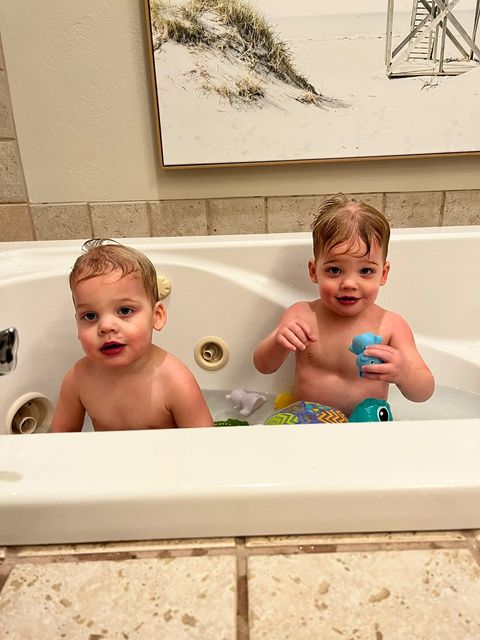


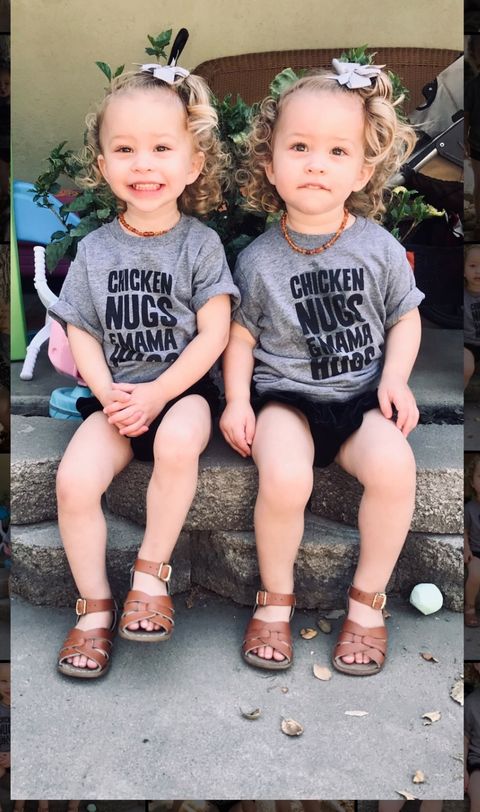


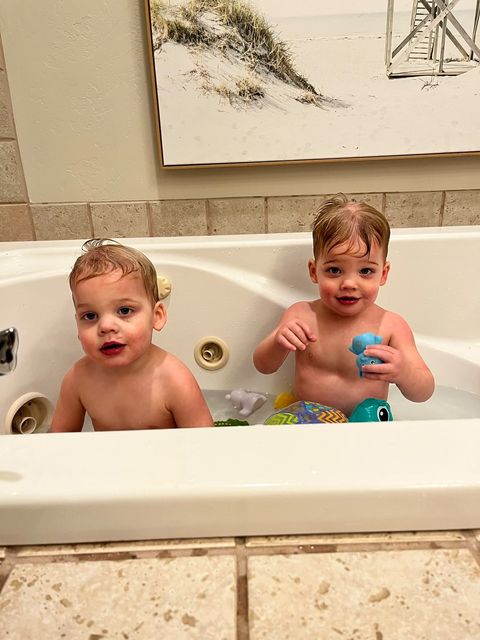
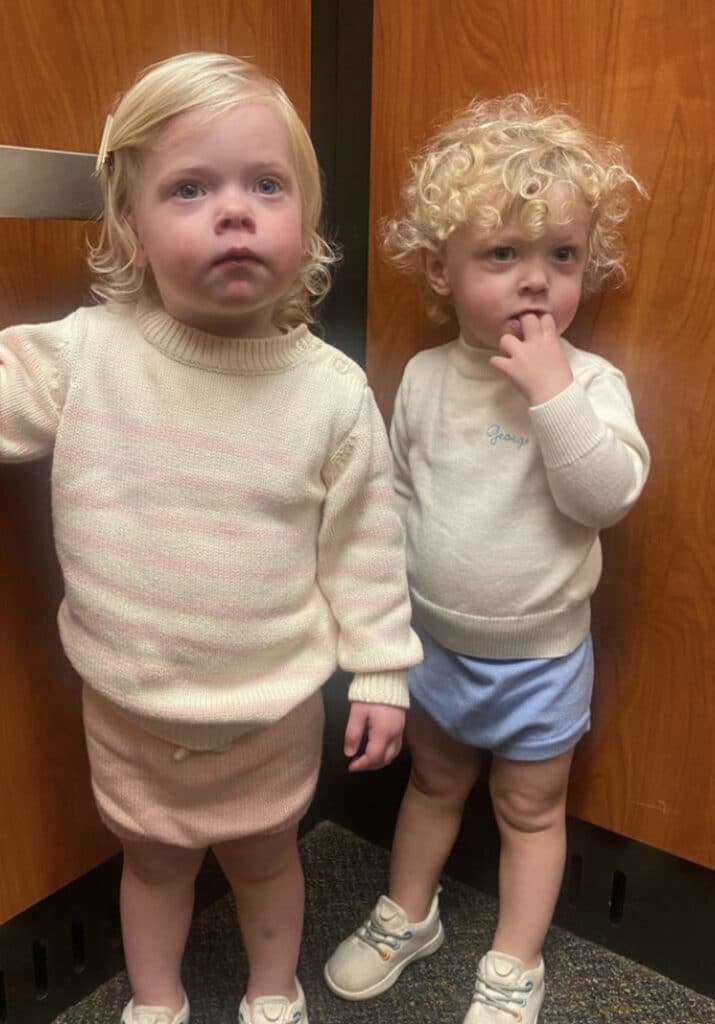
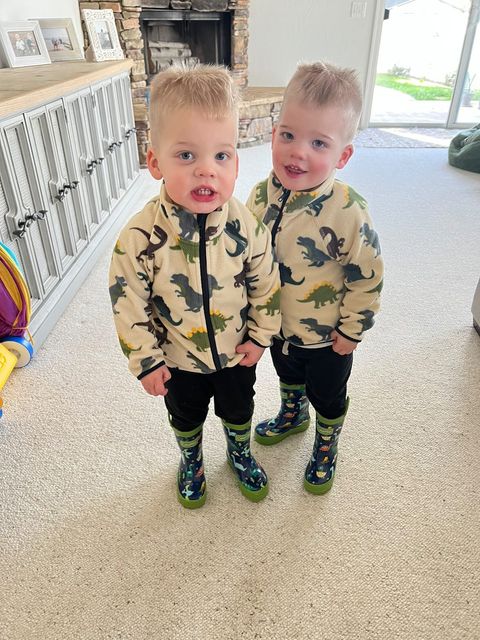
Sources
- Dr. Ilona Bendefy, Baby: Day by Day
- Dr. Frans X. Plooij and Dr. Hetty van de Rijt, The Wonder Weeks
- Marple, Kate, and Dawn Rosenberg. “When to Call 911: How to Tell If Your Baby Needs Emergency Care.” BabyCenter
- “Newborn Baby: When to Call the Doctor.” Cleveland Clinic
- “How Often and How Much Should Your Baby Eat?” HealthyChildren.org
- “Your 24-Month-Old Child.” What to Expect
- 24 Month Old Baby Development Milestones
- “Your Child at 2: Milestones.” WebMD, 12 May 2017







